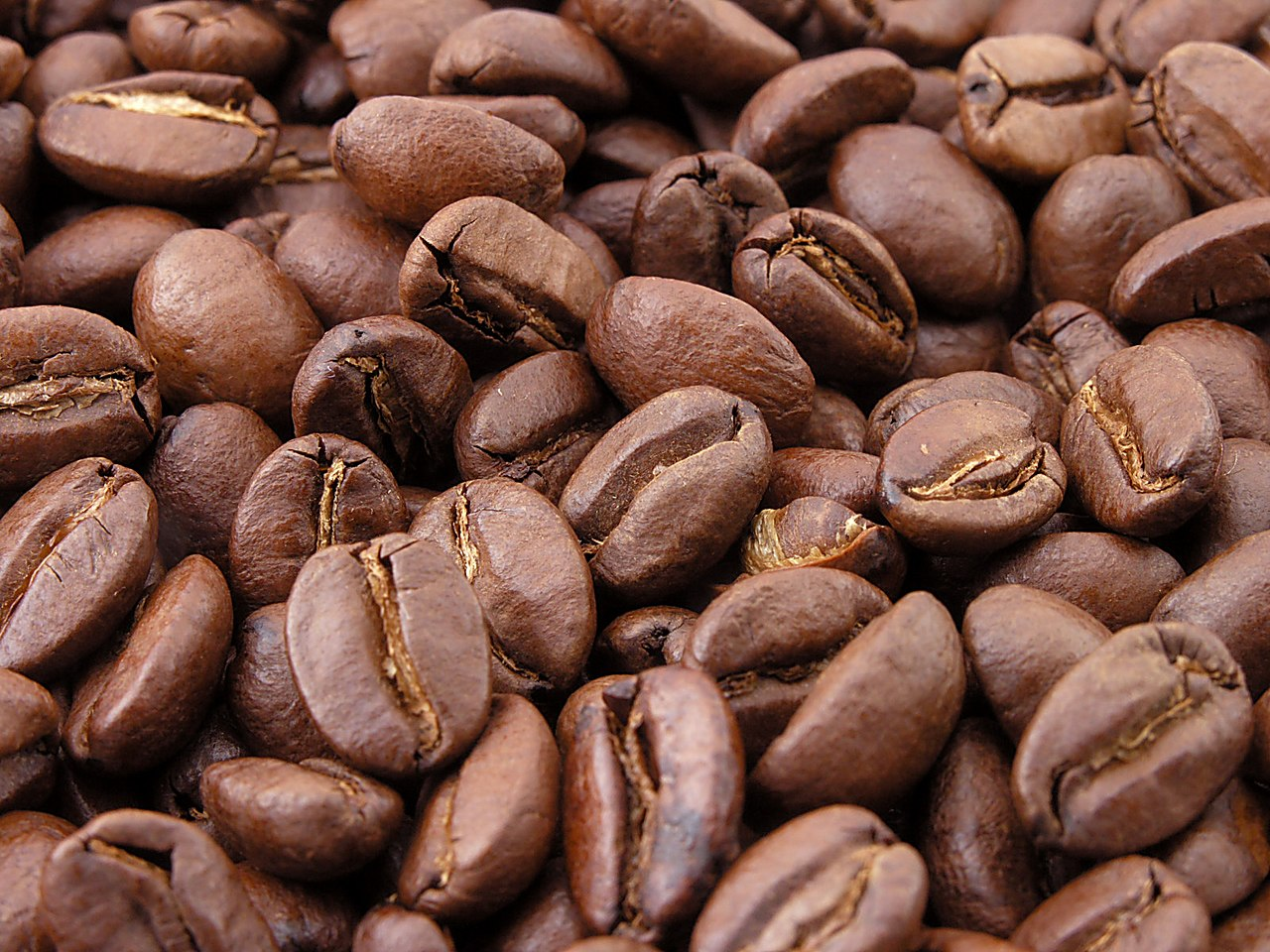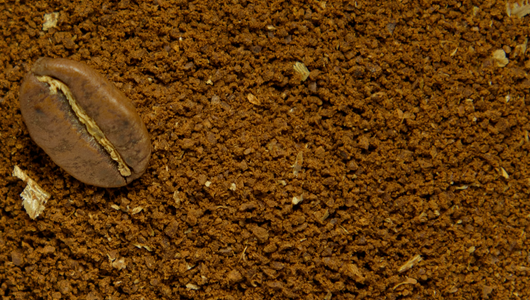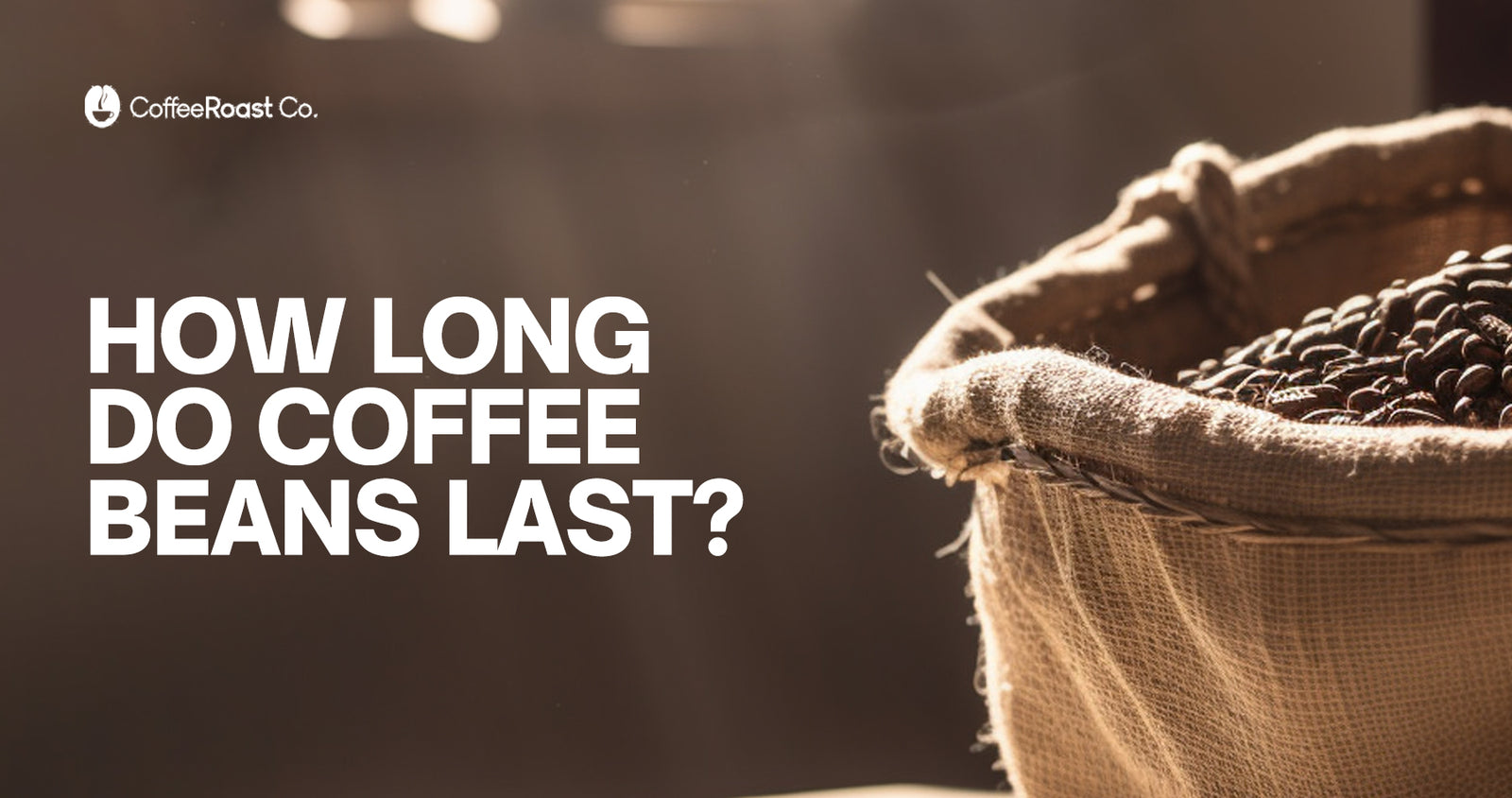Some folks chug down java for nothing more than a caffeine fix. Others though drink it to savor the flavor and aroma. To that end, the freshness of coffee beans is absolutely key.

Except the shelf lives of green, roasted and ground coffee beans varies dramatically. Not to mention, there’s all kinds of ways they can be stored to extend their lifespan.
So here at CoffeeRoast Co., we’ve got some guidelines and tips to help keep those little nuggets of liquid gold stay fresher for longer.
THE SHELF LIFE OF COFFEE BEANS
How long coffee beans stay fit for consumption hangs on all sorts of factors. Among others, how they’re grown, harvested, processed, and roasted. But also what form the beans take.
Green coffee beans
Actually the seeds of the coffee cherry, green beans have the longest shelf life of all.
As a rule of thumb, raw coffee beans keep for 2 or more years when stored under the right conditions.

Roasted coffee beans
As soon as green beans have been pulled out of the air roaster or drum roaster and degassed (variously for 24 hours to several days), they’re at their freshest. And therefore the very best time to brew them up in pursuit of their richest taste and aroma.
From that point onwards, the freshness clock for the roasted beans starts ticking.
By and large, the flavor and aroma of roasted whole coffee beans maxes out between four days and a fortnight after roasting. Some beans, on the other hand, are at their finest in the third or fourth week.
Otherwise, roasted beans will stay largely fresh for as little as 2 weeks to as much as a year after the roast date.
A store-bought unopened bag of beans should be consumed within about 6 weeks after roasting; the same opened, some 2 to 3 weeks.
A sealed vacuum-packed bag of beans which has never been opened, at least 2 or 3 months.
And those in a nitrogen-flushed bag with one-way valve, unopened, normally last for a good 12 months beyond the date they were roasted.

Ground coffee beans
When roasted whole beans are ground, much more of the beans’ surface area is exposed to various environmental elements. Meaning they lose their flavor and aroma the quickest of the lot.
To enjoy freshly ground beans at their peak, in fact, it’s best to brew them up within 15 to 30 minutes of grinding.
They’ll still taste okay for up to a week, and can be preserved for some 2 to 5 months if kept properly.

WHERE & HOW TO STORE COFFEE BEANS
Beyond coffee beans’ shelf life, careful storage is the answer to prolonging both their freshness and their concentration of disease-fighting antioxidants.
Storage containers
Green beans commonly ship in hermetically sealed bags. Once opened, unroasted beans are best transferred to a burlap sack or similar.
Right after roasting, beans should be put in a one-way valved pack. These let the beans degas carbon dioxide (mostly) but stop oxygen getting in.
Once degassed, whole beans (and the same for grounds), must be stored in an opaque airtight container. Something like a lidded stainless steel coffee vault will do the trick.
Sure, a Mason or Kilner jar might be better for showing off your shiny brown bombshells but being see-through, the light and heat will speed up the beans deteriorating.
Better yet are vacuum seal bags. Failing that, an everyday ziplock pouch from which as much air as possible has been squeezed or straw-sucked out. As a simple hack, try tossing in an oxygen absorber pad or two (and perhaps even a silica gel sachet to soak up any residual moisture).
Best of all for maximizing bean freshness, and the go-to packaging used by professional roasters, are bean-filled bags flushed with food-safe nitrogen to expel every last bit of oxygen. That way, the beans don't lose an ounce of freshness until the bag itself is cracked open.

Storage locations
Always keep coffee beans, in whatever form, well away from anything that might cause them to degrade. Places such as a sunlit counter-top, a cupboard next to a hot oven, or beside a steaming kettle should be avoided.
Instead, stash your precious beans somewhere cool, dark, and dry; a kitchen pantry, for example, is perfect.

DO’S & DON’TS FOR ENJOYING COFFEE BEANS FRESH
DO go for superior quality beans. Preferably organic so free of potentially toxic pesticides and the like, as well as higher in essential nutrients.
DON'T bulk buy beans. Tempting though it may be, odds on you won't be able to use them all up before a good proportion lose their freshness. Sooner snag a few small bags of beans in one go so infinitely less chance of them turning stale.
DO get whole beans and grind at home. Because roasted beans lose freshness rapidly after being ground, grinding at your own place makes for max flavor coffee. Plus, you have control over the texture and size of grounds that's right for your fave brewing method.
DO invest in a decent burr grinder. Compared to blade grinders which chop beans, burr grinders crush them giving a lot more consistent grind and a far better tasting brew.
DON'T grind beans long after the roast date - - Doing so will mean a less than fresh cup of coffee. On top of which, grind only what you need to avoid waste and so the coffee doesn't lose its optimum taste and smell.
FREQUENTLY ASKED QUESTIONS ABOUT THE SHELF LIFE & STORAGE OF COFFEE BEANS
Can you keep coffee beans in the fridge?
Contrary to popular habits, refrigerating coffee beans and even more so grounds is a big no-no.
Quite apart from soaking up all the odors around them, the sudden temperature change as they’re pulled out will causes condensation to build up on the beans.
Can you freeze coffee beans?
Not ideally, as it tends to make the beans look and taste rather flat.
All the same, if you’re concerned more with stretching your coffee beans' expiration date (by months if not years) or bought a ton of beans, then freezing is an option.
Just be sure to split the beans up into small portions enough for the amount of coffee you brew daily or weekly. And double bag each before popping them into the freezer.
Then, without opening the pack they’re in, thaw out the frozen coffee beans overnight at room temperature, and use up within 5 to 7 days.
For all that, there are joe lovers out there who swear freezing beans is the best way to maintain the intrinsic qualities of coffee. Even arguing that the aroma and taste of roasted coffee is better if the beans are frozen before undergoing the roasting process.
Do coffee beans go bad?
No matter their shelf life or how they’re stored, yes, coffee beans are perishable. They don’t spoil in the same way as, say, fresh fruit and bread, because they contain hardly any water.
But beans are highly sensitive to oxygen, light, high temperatures, and moisture- - any or all of which make for a loss of freshness.
Oxygen triggers a process called oxidation in beans. This causes certain chemical compounds (‘solubles’) in the coffee, those responsible for flavors and aromas, to react badly. Heat and UV rays speed up oxidizing the beans. While humidity encourages fungal mold to grow on the beans; some of which produce mycotoxins which contaminate beans/grounds making them unsafe to use.
How long do coffee beans last?
Exactly how fast beans/grounds go off depends on many things.
Arabica coffee beans are generally more susceptible to their environment hence have a slightly shorter shelf life than Robusta beans.
Whole beans break down slower than ground beans given their much smaller overall surface area.
Darker roast beans off-gas and oxidize at the fastest rate because they’re the most permeable to air and liquid. The delicate fragrance and taste of light roasted coffee beans, on the other hand, can usually be appreciated for a greater length of time.
How to tell if coffee beans are stale?
Using your senses of taste, smell, sight and touch, you can spot the telltale signs that coffee beans have gone off:
-
Taste test the beans. A sure-fire way to check if your beans have aged too much is to simply brew a cup. The older beans get, the less rounded their flavor. So if the coffee is bland, sour, or plain rancid, chances are the beans are past their best.
-
Sniff the beans. Fresh roasted or ground beans have that characteristically glorious aroma. Stale coffee beans give off little to no scent or worse, a musty even rotten odor.
-
Eyeball the beans. Thanks to natural oils rising to their surface during roasting, fresh beans usually have a gorgeous sheen to them. Over time, the oils evaporate with the beans losing their gloss and taking on a dull appearance.
-
Feel the grounds. Fresh coffee grounds should have traces of moisture to them. If old, they’ll be dry and powdery to the touch.
Are old coffee beans safe to drink?
Although it won’t taste or smell nearly as spectacular as a brew made with beans at their freshest, drinking coffee using expired beans won’t make you sick.
The only exception is if the beans or grounds especially are moldy; in which case, they should be binned.
What to do with old coffee beans?
Just because coffee beans are past their prime doesn’t mean they should be thrown out.
Surprisingly versatile, here’s a few creative and fun ideas for using up old beans:
-
Whip up a cold brew
-
Shake up a coffee cocktail
-
Recipe a dessert like tiramisu
-
Coat whole beans in chocolate
-
Season and tenderize steaks
-
Craft bean-themed artwork and décor
-
Dye clothes and other fabrics
-
Feed plants and keep unwanted bugs at bay
-
Knock up a body scrub

KEEPING IT FRESH
Nothing beats fresh coffee. And the fresher the beans, the better tasting and smelling the final brew.
How long the different types of coffee beans stay fresh differs considerably; from years for unroasted beans to mere minutes with just ground beans.
Thankfully, most of the beans’ freshness can be locked in by keeping them inside non-clear oxygen-free packaging in any cool, dry, dark spot except the fridge.
And if coffee beans do get too old for a cup, just repurpose them!
As one of the most important ways to achieving the freshest coffee, why not pour over our step-by-step guide on how to grind beans like a pro.





Bill Maass
September 04, 2025
Thank you for this great information. Your site came up on a Google search for me near the top. My question was , Do vacuum sealed coffee beans go bad. I asked the question because I had a couple of bags I found at the very back of my pantry and was wondering if I had to toss them. I will open the bag and serve myself up a cup and hopefully as tight as this coffee is packed, there is little oxygen in it. My buddies is one of your competitors but he doesn’t have this info on his website so kudos to you. 20 years ago he started out with a little hand crank cage in his basement to make himself a fresh cup of Joe and later quit his job as a barber to sell around the Chicago area. However COVID knocked his business on its butt so he is retiring this year . The more of you guys in the business tho, it keeps you all in your toes to produce the very best product for us consumers. Happy Roasting!